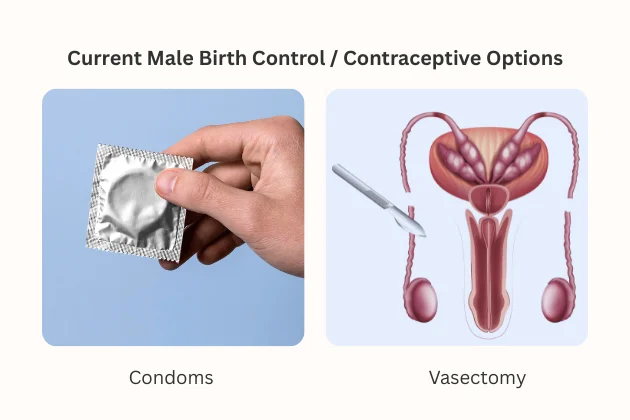For decades, birth control has been seen as a woman’s responsibility. From pills and IUDs to injections and implants, women have carried the physical and hormonal burden of preventing pregnancy. However, this dynamic is starting to change.
Condoms and vasectomies have been the only birth control options for men. But a new breakthrough is shifting the narrative. A first-of-its-kind male birth control pill, called YCT-529, has just successfully passed its first human safety trial and is non-hormonal and potentially game-changing for men. This is exciting and hopeful for more equal contraceptive responsibility.
Contraceptive Burden Falls Primarily on Women
Despite all the technological and medical innovations, most birth control methods have been designed for women: pills, patches, IUDs, implants, and surgical options like tubal ligation.
Women have carried the burden of preventing pregnancy for generations, often at the expense of their health, hormones, and mental well-being. Men have had two options: condoms or a vasectomy. That’s not just a medical oversight; it’s a gender equity issue.

This imbalance creates stress, frustration, and sometimes health risks for women:
- Some women experience side effects from hormonal contraceptives, such as mood swings, weight gain, or irregular bleeding.
- Long-term fertility concerns with certain birth control methods.
- Psychological stress of unplanned pregnancies when partners depend entirely on female methods.
Imagine this scenario: a couple in their late 20s not ready for kids. The woman has been on hormonal birth control for 5 years and is dealing with migraines and emotional fluctuations. Her partner wants to help, but his only options are condoms or a vasectomy – either unreliable or permanent. A safe male pill could give them a third option, reduce her health burden, and share the responsibility.
Current Male Birth Control / Contraceptive Options
- Condoms – Widely available but user error-prone
- Vasectomy – Permanent or partially reversible; requires surgery
- Withdrawal – Unreliable and not medically recommended

The lack of reversible male contraceptives puts pressure on women. With rising awareness around gender equity in reproductive health, people are asking: “When will male birth control pill be available?“
According to a 2023 study published in ScienceDirect, 75% of men in the U.S. and Canada expressed willingness to try new contraceptive methods.
In another Research from the Male Contraceptive Initiative, nearly 56% of U.S. men aged 18 to 49 showed strong interest in non-permanent contraception.
Why Has Male Birth Control Taken So Long?
Biological and systemic challenges have held us back:
- Hormonal challenges: Most previous experimental male pills relied on hormonal manipulation. These had potential risks, like mood swings, low libido, and cardiovascular concerns.
- Biological complexity: Women release one egg per month; men produce millions of sperm daily. Suppressing this without affecting hormones has been difficult.
- Research gaps: Most funding and commercial interest historically went to female contraceptives.
But researchers did not give up.
Historical Context: A Long Journey in Male Contraceptive Research
The search for male contraception has been ongoing for decades. In the 1970s, early hormonal injections for men were tested but abandoned due to side effects. Since then, various approaches – testosterone-based pills, injections, and implants – have been tried. But all had hormonal risks and poor compliance. YCT-529 is a game changer: it targets a biological process essential for sperm production without affecting hormones.
Breakthrough: YCT-529 – The First Non-Hormonal Male Birth Control Pill
Study published in Communications Medicine on 22 July 2025
Researchers made headlines when a first-of-its-kind, non-hormonal candidate called YCT-529 has completed an early Phase-1 single-dose human safety trial.
The trial, designed to test safety and pharmacokinetics, found no serious adverse events in 16 vasectomized men. While preclinical studies show the drug can suppress sperm and is reversible in animals, human efficacy (sperm suppression) and recovery after repeat dosing are currently being tested in follow-up trials.
What is YCT-529?
YCT-529 is an oral, non-hormonal & reversible male birth control pill developed by YourChoice Therapeutics. It’s an alternative to hormone-based methods. It blocks sperm production without affecting testosterone levels, mood, or libido.
The pill has just passed its first human safety trial—a big deal in contraceptive innovation.
How the Male Birth Control Pill YCT-529 Works
Let’s get into the science of how this male birth control pill actually works.
- Mechanism of Action: The pill blocks the retinoic acid receptor alpha (RAR-α) in the testes. This receptor binds to a metabolite of vitamin A, which is needed for sperm production.
- Reversible & Non-Hormonal: By blocking RAR-α, the pill stops sperm production without changing testosterone or hormone levels.
- Recovery: Once stopped, sperm production resumes in 3 months for temporary contraception.
This non-hormonal mechanism makes YCT-529 a safer option with fewer side effects.
Biologically, spermatogenesis takes about three months, so many male-contraceptive studies use that timescale as a working hypothesis. However, human data on how long YCT-529 must be taken to suppress sperm — and how quickly fertility returns — are not yet available; these questions are being evaluated in ongoing multi-dose trials.”
| Name of Pill | YCT-529 |
| Type | Non-hormonal, oral pill |
| Developer | YourChoice Therapeutics |
| Phase 1 Trial Participants | 16 men with vasectomies |
| Safety Profile | Well-tolerated, no severe side effects |
| Mode of Action | Blocks vitamin A metabolite receptor |
| Duration Before Effectiveness | Unknown in humans. Spermatogenesis is 3 months biologically, so researchers often use that timeframe for study design; human multi-dose trials will determine the actual time to sperm suppression. |
| Reversibility | Demonstrated in animal studies; human recovery timing after contraceptive dosing is not yet established. |
Clinical Trial Results
- Phase: 1
- Participants: 16 healthy men with vasectomies (for safety control)
- Findings: The initial Phase-1 study reported that YCT-529 was well tolerated with no serious adverse events in the 16 participants; this small sample and single-dose design means larger and longer studies are needed to fully understand safety.
Challenges Ahead
YCT-529 looks good, but more to do:
- Bigger clinical trials with more diverse participants
- Regulatory approval from the FDA and global agencies
- Long-term data on side effects and reversibility
- Commercial interest and affordability
Glossary of Key Terms
| RAR-α (Retinoic Acid Receptor Alpha) | A protein in the testes that binds to vitamin A derivatives essential for sperm production |
| Non-Hormonal | Does not interfere with testosterone or other sex hormones |
| Phase 1 Clinical Trial | First stage in human testing, focusing on safety and dosage |
| Vasectomy | A surgical procedure that cuts or blocks the vas deferens to prevent sperm release |
| Vasovasostomy | Surgical reversal of a vasectomy |
Other Male Contraceptive Developments
YCT-529 isn’t the only one. Researchers are also working on:
- RISUG (Reversible Inhibition of Sperm Under Guidance) – A polymer gel injected into the vas deferens
- Vasalgel – A US-based version of RISUG in trials
- Other Non-Hormonal Pills – Including agents that temporarily immobilize sperm
These will give us multiple options for male contraception.
Social and Cultural Impact: Redefining Reproductive Roles
Male contraception isn’t just about biology—it’s about balance.
- Empowers men to take control of fertility
- Relieves women from sole responsibility
- Improves couple dynamics through shared responsibility
- Promotes equality in sexual and reproductive health
Conclusion: A New Era for Contraception and Equality
The male birth control pill YCT-529 could be the start of a big change in reproductive health. It’s safe, reversible, and hormone-free for men – so both partners can plan for a family.
It may be years before it’s publicly available, but the progress is real. At Lotus Femcare, we believe reproductive responsibility should be shared. We’ll keep you posted on the updates that empower women and men.
Also Read: How to Get Periods Immediately



